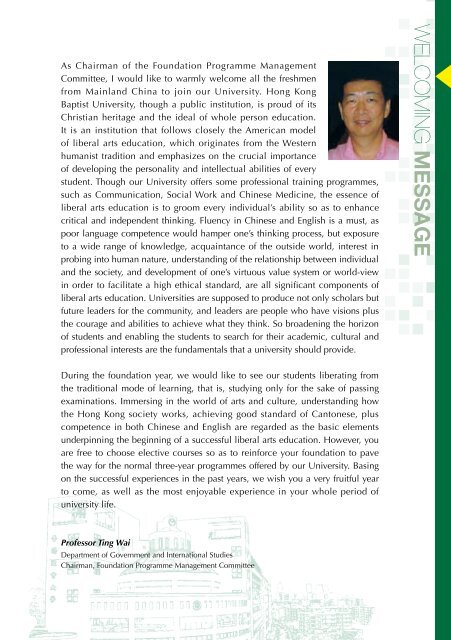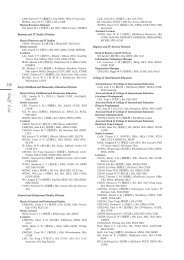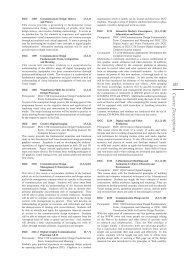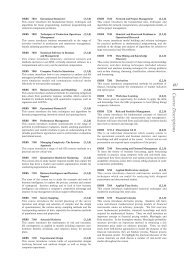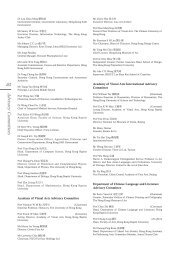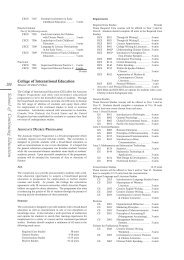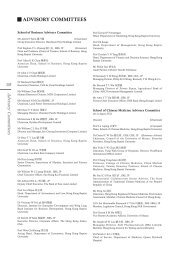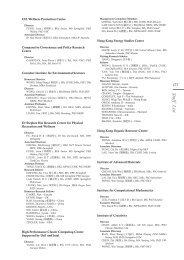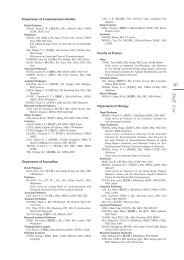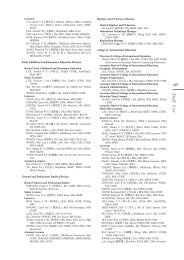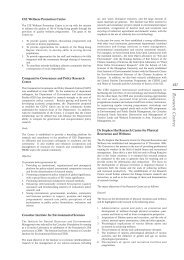WELCOMING MESSAGE - Academic Registry - Home - Hong Kong ...
WELCOMING MESSAGE - Academic Registry - Home - Hong Kong ...
WELCOMING MESSAGE - Academic Registry - Home - Hong Kong ...
Create successful ePaper yourself
Turn your PDF publications into a flip-book with our unique Google optimized e-Paper software.
As Chairman of the Foundation Programme Management<br />
Committee, I would like to warmly welcome all the freshmen<br />
from Mainland China to join our University. <strong>Hong</strong> <strong>Kong</strong><br />
Baptist University, though a public institution, is proud of its<br />
Christian heritage and the ideal of whole person education.<br />
It is an institution that follows closely the American model<br />
of liberal arts education, which originates from the Western<br />
humanist tradition and emphasizes on the crucial importance<br />
of developing the personality and intellectual abilities of every<br />
student. Though our University offers some professional training programmes,<br />
such as Communication, Social Work and Chinese Medicine, the essence of<br />
liberal arts education is to groom every individual’s ability so as to enhance<br />
critical and independent thinking. Fluency in Chinese and English is a must, as<br />
poor language competence would hamper one’s thinking process, but exposure<br />
to a wide range of knowledge, acquaintance of the outside world, interest in<br />
probing into human nature, understanding of the relationship between individual<br />
and the society, and development of one’s virtuous value system or world-view<br />
in order to facilitate a high ethical standard, are all significant components of<br />
liberal arts education. Universities are supposed to produce not only scholars but<br />
future leaders for the community, and leaders are people who have visions plus<br />
the courage and abilities to achieve what they think. So broadening the horizon<br />
of students and enabling the students to search for their academic, cultural and<br />
professional interests are the fundamentals that a university should provide.<br />
<strong>WELCOMING</strong> <strong>MESSAGE</strong><br />
During the foundation year, we would like to see our students liberating from<br />
the traditional mode of learning, that is, studying only for the sake of passing<br />
examinations. Immersing in the world of arts and culture, understanding how<br />
the <strong>Hong</strong> <strong>Kong</strong> society works, achieving good standard of Cantonese, plus<br />
competence in both Chinese and English are regarded as the basic elements<br />
underpinning the beginning of a successful liberal arts education. However, you<br />
are free to choose elective courses so as to reinforce your foundation to pave<br />
the way for the normal three-year programmes offered by our University. Basing<br />
on the successful experiences in the past years, we wish you a very fruitful year<br />
to come, as well as the most enjoyable experience in your whole period of<br />
university life.<br />
Professor Ting Wai<br />
Department of Government and International Studies<br />
Chairman, Foundation Programme Management Committee
H<br />
AN O<br />
D<br />
B K<br />
FOR FOUNDATION STUDENTS 2011/2012
Programme and Course Information<br />
1.1 Curriculum and Study Schedule........................................... 04<br />
1.2 Course Description.............................................................. 06<br />
1.3 Qualifying Test for English Language Courses....................... 09<br />
1.4 English Bridging Course....................................................... 10<br />
General Regulations for Foundation Programme &<br />
Related Information<br />
2.1 <strong>Academic</strong> Regulations Governing the Studies of<br />
Foundation Programme........................................................ 11<br />
2.2 Completion of Foundation Programme................................. 11<br />
2.3 Course Exemption................................................................ 12<br />
2.4 Change of Study Programme................................................ 13<br />
2.5 University Information System.............................................. 13<br />
TABLE OF CONTENTS<br />
Frequently Asked Questions<br />
3.1 Course Registration.............................................................. 14<br />
3.2 Class Attendance.................................................................. 14<br />
3.3 Scholarship.......................................................................... 15<br />
3.4 Visa Extension...................................................................... 16<br />
3.5 Internship / Part-time Job...................................................... 16<br />
Other Information<br />
4.1 <strong>Academic</strong> Calendar 2011/2012............................................ 20<br />
4.2 Useful Contacts.................................................................... 22<br />
4.3 Campus Maps and Building Codes....................................... 24
H<br />
AN O<br />
D<br />
B K<br />
FOR FOUNDATION STUDENTS 2011/2012<br />
Programme and Course Information<br />
1.1 Curriculum and Study Schedule<br />
(a) Science Foundation Programme (for students admitted to Bachelor of Science<br />
programmes)<br />
Semester 1<br />
Units<br />
ACEP0010 Arts and Culture 3<br />
LANG0131 Guangdonghua I 1<br />
LANG0150 # English Listening & Speaking (Upper-Intermediate) 3<br />
LANG0170 # Integrated English (Upper-Intermediate) 3<br />
MATH0021 Mathematics for Science I 3<br />
PHYS1121 General Physics I 3<br />
SCE 0020 Understanding <strong>Hong</strong> <strong>Kong</strong>: Society and Culture 3<br />
Semester Total: 19<br />
Semester 2<br />
Units<br />
BIOL0010 Invitation to Biology 3<br />
CHEM0010 Foundation of Chemistry 3<br />
I.T.1180 Information Management Technology 3<br />
LANG0132 Guangdonghua II 1<br />
LANG0160 # English Listening & Speaking (Advanced) 3<br />
LANG0180 # Integrated English (Advanced) 3<br />
MATH0022 Mathematics for Science II 3<br />
Semester Total: 19<br />
Programme Total#: 38<br />
# Students passing the Qualifying Test for English Language Courses @ will be exempted from<br />
LANG0150 and LANG0170, and will be required to take the two Semester 2 English language<br />
courses (LANG0160 and LANG0180) in Semester 1.<br />
Students completing LANG0160 and LANG0180 in Semester 1 will be required to take 1 – 2<br />
elective course(s) (i.e. 3 – 6 units) in Semester 2 to make up for a total of not less than 35 units<br />
for the programme.<br />
@<br />
Please refer to Section 1.3 for detailed information about the Qualifying Test for English<br />
Language Courses.<br />
4
(b) Non-Science Foundation Programme (for students admitted to programmes<br />
other than the Bachelor of Science programmes)<br />
Semester 1<br />
Units<br />
ACEP0010 Arts and Culture 3<br />
COMP0010 A Gateway to Computer Science 3<br />
LANG0131 Guangdonghua I 1<br />
LANG0150 # English Listening & Speaking (Upper-Intermediate) 3<br />
LANG0170 # Integrated English (Upper-Intermediate) 3<br />
MATH0011 Mathematics for Non-Science I 3<br />
SCE 0020 Understanding <strong>Hong</strong> <strong>Kong</strong>: Society and Culture 3<br />
Semester Total: 19<br />
Semester 2<br />
Units<br />
LANG0132 Guangdonghua II 1<br />
MATH0012 Mathematics for Non-Science II 3<br />
LANG0160 # English Listening & Speaking (Advanced) 3<br />
LANG0180 # Integrated English (Advanced) 3<br />
2 to 3 Elective Courses # 6 – 9<br />
Semester Total: 16-19<br />
Programme Total: 35-38<br />
# Students passing the Qualifying Test for English Language Courses @ will be exempted from<br />
LANG0150 and LANG0170, and will be required to take the two Semester 2 English language<br />
courses (LANG0160 and LANG0180) in Semester 1.<br />
Students completing LANG0160 and LANG0180 in Semester 1 will be required to take 2<br />
additional elective courses (i.e. 6 units) in Semester 2 to make up for a full study load. That is,<br />
students need to take a total of 4–5 elective courses in Semester 2 to satisfy the total units (35 –<br />
38) required for the programme.<br />
@<br />
Please refer to Section 1.3 for detailed information about the Qualifying Test for English<br />
Language Courses.<br />
5
H<br />
AN O<br />
D<br />
B K<br />
FOR FOUNDATION STUDENTS 2011/2012<br />
1.2 Course Description<br />
ACEP0010 Arts and Culture (3,3,0)<br />
This is a project-based cum experiential course, supplemented by weekly threehour<br />
lectures or workshops. The practicum part, besides three to four visits to<br />
artistic performances followed mostly by post-performance discussions with the<br />
auteurs, consists mainly of an intensive socio-cultural field study project in groups<br />
of three. The projects, led by various district councillors and social workers, focus<br />
on thought-provoking social topics in the urban areas of <strong>Hong</strong> <strong>Kong</strong>.<br />
Toward the end of semester, the findings of the 50 or so field projects will be<br />
presented in 6 parallel sessions. These findings, duly critiqued by experts and<br />
fellow students, are to be written up formally. These reports, together with the field<br />
efforts, log entries and the oral presentation, will be counted as part of the final<br />
assessment. Some class hours will be devoted to training the students in field study<br />
techniques and others to expanding on the benefits derived from the practical<br />
undertakings. Some other gatherings will focus on matters related to or arising<br />
from the visits to artistic performances.<br />
The course is intended to be writing-intensive, where learning-through-writing will<br />
be practiced.<br />
BIOL0010 Invitation to Biology (3,3,0)<br />
This course is intended for students who need a broad background in biology. Each<br />
student will learn the major principles and mechanisms in the biological sciences<br />
as background for pursuing BSc degree in Biology.<br />
CHEM0010 Foundation of Chemistry (3,3,0)<br />
This is intended to be the first chemistry course for all Science Majors in the<br />
Foundation programme. It is aimed to provide these students with a solid<br />
understanding of some fundamental concepts and physical principles in chemistry.<br />
The topics discussed include theories of atomic and molecular structures, chemical<br />
bonding, intermolecular forces and states of matter, acid-base chemistry and<br />
functional group chemistry of some organic compounds.<br />
6
COMP0010 A Gateway to Computer Science (3,2,1)<br />
(for Non-Science Students)<br />
This course is designed for the foundation programme students only. No<br />
experience with computers is assumed. The aim is to teach students the<br />
fundamentals of computers, particularly with respect to personal computer<br />
hardware and software, and the World Wide Web. Students will finish the course<br />
with a solid understanding of computer principles, how to use computers, and<br />
how to access information on the World Wide Web. Particularly, students will gain<br />
hands-on experience on using common software packages.<br />
I.T.1180 Information Management Technology (3,2,1)<br />
(for Science Students)<br />
This course is designed for the leaders of tomorrow. Its special aim is to prepare<br />
students for the challenges of tomorrow’s workplace by equipping them with<br />
practical knowledge and skills to engage in fast-moving information technology<br />
(IT). Its main thrust is the incorporation of essential as well as tailor-made, forwardlooking<br />
IT concepts illustrated with real-world examples and coupled with handson<br />
experiences in the support of the information management cycle.<br />
LANG0131-2 Guangdonghua I - II 粵 語 ( 一 ) - ( 二 ) (1,2,0)<br />
本 課 程 為 大 學 本 科 先 修 班 的 基 礎 課 程 , 專 為 以 普 通 話 為 母 語 的 學 生 而 設 。 本 科 理 論 與<br />
實 踐 並 重 , 通 過 音 標 及 粵 普 對 照 , 循 序 漸 進 為 學 生 初 步 提 供 有 系 統 的 廣 州 話 聽 、 讀 、<br />
講 的 訓 練 , 從 而 提 高 廣 州 話 的 整 體 應 用 能 力 。<br />
LANG0150 English Listening and Speaking (Upper-Intermediate) (3,3,0)<br />
This upper-intermediate English listening and speaking course aims at raising<br />
students’ awareness of different genres and styles of authentic speech, and<br />
improving their proficiency in English listening and speaking. The course adopts<br />
a communicative approach and students will develop language skills through a<br />
variety of activities including watching news reports, watching films, role-play,<br />
small group discussion, reading poems etc. The topics selected are interesting,<br />
informative and universal and cover a wide range of areas including politics,<br />
economics, science, entertainments, etc.<br />
7
H<br />
AN O<br />
D<br />
B K<br />
FOR FOUNDATION STUDENTS 2011/2012<br />
LANG0160 English Listening and Speaking (Advanced) (3,3,0)<br />
The advanced English listening and speaking course aims to raise students’<br />
awareness of different genres and styles of authentic speech and to improve<br />
students’ proficiency in English listening and speaking, with advanced-level<br />
materials and more challenging tasks. Students will get ample opportunities to<br />
practice these skills in an integrated manner and develop the skills through a<br />
variety of activities, including listening to academic lectures and documentaries,<br />
watching videos and films, role-play, small group discussion, delivering a formal<br />
speech, and giving an academic presentation. The topics selected cover a range of<br />
media and sources.<br />
LANG0170 Integrated English (Upper-Intermediate) (3,3,0) and<br />
LANG0180 Integrated English (Advanced) (3,3,0)<br />
These two courses form a complete project of integrated English specially designed<br />
for Foundation students from Mainland China, with the upper-intermediate course<br />
offered in the first semester and the advanced course in the second semester of<br />
their foundation year. The courses aim at helping students acquire the competence<br />
to use English more effectively for real life communications and academic<br />
development in <strong>Hong</strong> <strong>Kong</strong>. They provide English language practice in all four<br />
skills of reading, listening, speaking and writing, with a focus on reading and<br />
writing, in context of topics of global interests; and engage students in tasks which<br />
help develop an intercultural awareness.<br />
MATH0011-2 Mathematics for Non-Science I - II (3,3,0)<br />
This course is designed for the pre-university studies of students who have<br />
graduated from secondary schools in the Mainland China. The contents of this<br />
course provide students the necessary knowledge of mathematics for their firstyear<br />
studies in universities in <strong>Hong</strong> <strong>Kong</strong>.<br />
MATH0021-2 Mathematics for Science I - II (3,3,0)<br />
This course aims at introducing basic ideas and techniques in advanced<br />
mathematics for students who have to use mathematics, especially calculus<br />
and statistics, in their university studies; developing students’ ability in proving<br />
theorems; and enhancing students’ logical thinking. After taking this course,<br />
students are expected to master the foundation of advanced mathematics.<br />
8
PHYS1121 General Physics I (3,3,0)<br />
This course covers classical mechanics and thermodynamics at an introductory<br />
level. After a brief review of Newton’s three laws, a number of applications<br />
illustrating the use of conservation laws and calculus are discussed. This is<br />
followed by an elementary treatment of rigid body and fluid mechanics. The<br />
last part deals with thermal phenomena and the use of statistical concepts in<br />
describing the gaseous state.<br />
SCE 0020 Understanding <strong>Hong</strong> <strong>Kong</strong>: Society and Culture (3,3,0)<br />
Many non-local students who come to study in the local universities do not often<br />
come prepared with an adequate knowledge about <strong>Hong</strong> <strong>Kong</strong>. The focus of<br />
this course is in stressing the importance of promoting a general understanding<br />
about the major aspects of the <strong>Hong</strong> <strong>Kong</strong> society. Through lectures, video,<br />
presentation and field visits, the study will enable students to make better sense<br />
of their surroundings and the context wherein they come to live and learn. Upon<br />
successful completion of the course, students should be able to have a basic<br />
understanding of the society of <strong>Hong</strong> <strong>Kong</strong> with particular reference to its sociocultural<br />
developments since 1997; and an appreciation and awareness of the<br />
distinctive ways of life of the <strong>Hong</strong> <strong>Kong</strong> Chinese.<br />
1.3 Qualifying Test for English Language Courses<br />
According to the programme curriculum, Foundation Students are required to take<br />
the following 4 English language courses:<br />
LANG0150 English Listening & Speaking (Upper-Intermediate)<br />
LANG0160 English Listening & Speaking (Advanced)<br />
LANG0170 Integrated English (Upper-Intermediate)<br />
LANG0180 Integrated English (Advanced)<br />
Students who possess a certain level of English language proficiency may be<br />
exempted from taking LANG0150 and LANG0170. The Language Centre will<br />
arrange an optional Qualifying Test for English Language Courses in August.<br />
Foundation students may choose to take the examination and if they pass it, they<br />
will be exempted from these two language courses.<br />
Foundation students will be invited to take the Qualifying Test and have to make<br />
applications to the <strong>Academic</strong> <strong>Registry</strong> by a deadline, normally before their arrival<br />
to <strong>Hong</strong> <strong>Kong</strong>.<br />
9
H<br />
AN O<br />
D<br />
B K<br />
FOR FOUNDATION STUDENTS 2011/2012<br />
1.4 English Bridging Course<br />
It is University policy that all first-year undergraduate students without Grade D or<br />
above in AS Use of English or equivalent qualifications@ are required to take the<br />
English Bridging Course (EBC) before commencement of their Year I studies.<br />
Foundation Students who have attained Grade C+ or above for BOTH advanced<br />
level English language courses (LANG0160 and LANG0180) in the Foundation<br />
Programme will be exempted from the English Bridging Course.<br />
@<br />
The University accepts the following qualifications as equivalent to Grade D in AS Use of<br />
English:<br />
a) A score of 550 (paper-based) or 213 (computer-based) or 80 (Internet-based) or above in TOEFL; or<br />
b) A score of 7 or above in IELTS, <strong>Academic</strong> Level; or<br />
c) Grade D or above in GCE AS Level or AL English; or<br />
d) Grade C or above in GCE O Level/GCSE/IGCSE English; or<br />
e) Score 4 or above out of 7 in IB English A1 or A2.<br />
10
General Regulations for Foundation Programme & Related Information<br />
2.1 <strong>Academic</strong> Regulations Governing the Studies of Foundation<br />
Programme<br />
Foundation Students will receive a copy of the Calendar / Bulletin in compact disk<br />
format during Orientation and before commencement of studies. Information such<br />
as the academic calendar, general regulations, programme curriculums, course<br />
descriptions, fees and charges, scholarships and financial aid etc. are covered<br />
in the Calendar / Bulletin. Though the Calendar / Bulletin contains information<br />
for degree programmes, the General Regulations for Undergraduate Degree<br />
Programmes, in general, are applicable to the Foundation Programme. Students<br />
are therefore strongly advised to look at the regulations stated in the Calendar /<br />
Bulletin.<br />
The Calendar / Bulletin is also available at the <strong>Academic</strong> <strong>Registry</strong> website at:<br />
http://buar.hkbu.edu.hk/ .<br />
2.2 Completion of Foundation Programme<br />
To satisfactory complete the Foundation Programme and progress to undergraduate<br />
programme, students are required to:<br />
(i) obtain the total number of units required and pass all courses stipulated by the<br />
programme (refer to Section 1.1); and<br />
(ii) attain a cumulative GPA of 2.00 or above for all courses attempted.<br />
2.2.1 Progression to Undergraduate Studies<br />
Upon successful completion of the Foundation Programme, students will<br />
progress to undergraduate degree programmes which they have been admitted<br />
to in September of the following academic year.<br />
2.2.2 <strong>Academic</strong> Problems<br />
Students with poor academic results will be given academic warning /<br />
academic probation at the end of a semester if their GPA falls into the<br />
following categories:<br />
11
H<br />
AN O<br />
D<br />
B K<br />
FOR FOUNDATION STUDENTS 2011/2012<br />
<strong>Academic</strong> Warning : Applicable to students with semester GPA between 1.70<br />
and 1.99 for a given semester.<br />
<strong>Academic</strong> Probation : Applicable to students with semester GPA below 1.70<br />
for a given semester.<br />
<strong>Academic</strong> Dismissal : As required by the Senate when the student’s semester<br />
GPA is below 1.70 for two consecutive semesters, or<br />
on other academic grounds.<br />
At the discretion of individual Department/Programme, students with poor<br />
academic performance may be required to repeat the Foundation Programme<br />
or to terminate their studies at the University.<br />
2.2.3 Dismissal<br />
The University may at any time require any student to terminate his/her studies<br />
at the University either on academic or disciplinary grounds, or on other<br />
grounds deemed as appropriate.<br />
The University may also dismiss a student whose conduct or general influence<br />
is considered harmful to the institution. Such a student will normally not be<br />
considered for re-admission.<br />
2.3 Course Exemption<br />
2.3.1 LANG1491 English I<br />
All undergraduate students are required to take English I (LANG1491).<br />
Foundation Students who have attained Grade A- or above for BOTH advanced<br />
level English language courses (LANG0160 and LANG0180) in the Foundation<br />
Programme will be granted exemption from LANG1491, and are recommended<br />
to take one of the following courses as substitution of LANG1491:<br />
LANG2140 Language Use and Communication: Theory and Practice<br />
LANG2210 Advanced English Pronunciation<br />
LANG2220 English through Current Events<br />
LANG2230 Advanced Listening in English<br />
2.3.2 Other Undergraduate Level Courses<br />
Foundation Students who have attained a Grade C or above for any<br />
undergraduate level courses (level one and above courses) in the Foundation<br />
Programme will be exempted from these courses during their undergraduate<br />
studies.<br />
12
Students are not allowed to retake these exempted courses during their<br />
undergraduate studies, and are required to replace them with other courses to<br />
make up for the units being exempted. These exempted courses will be shown<br />
in the Transcript of <strong>Academic</strong> Record for undergraduate studies with a remark<br />
“EX” (exempted), and will not be included in GPA calculation.<br />
2.4 Change of Study Programme<br />
Once admitted to a certain study programme, students are normally not allowed<br />
to change to other undergraduate degree programmes. Special approval, however,<br />
may be given by some Schools/Faculties for students to apply for Change of Study<br />
Programme within their respective School/Faculty. The <strong>Academic</strong> <strong>Registry</strong> will<br />
notify Foundation Students of the application procedures around April each year.<br />
2.5 University Information System<br />
The University Information System (UIS) allows students to access their personal<br />
data and study related information through an account and password. Students<br />
can access the following information through UIS:<br />
(a) Personal Particulars<br />
(b) Enrolment Records<br />
(c) Class and Examination Timetable<br />
(d) Examination Information<br />
(e) Transcript of <strong>Academic</strong> Record<br />
(f) Finance (such as tuition payment notification)<br />
Foundation Students will receive their UIS login password via the University email<br />
account after arrival to <strong>Hong</strong> <strong>Kong</strong>.<br />
13
H<br />
AN O<br />
D<br />
B K<br />
FOR FOUNDATION STUDENTS 2011/2012<br />
Frequently Asked Questions<br />
3.1 Course Registration<br />
Q3.1.1 How can I register on courses<br />
You will automatically be registered on courses which are required by the<br />
Foundation Programme. For registration of elective courses in Semester 2, you<br />
will be notified of the procedures by the <strong>Academic</strong> <strong>Registry</strong> around October.<br />
Q3.1.2 Where can I find the elective courses available for my selection<br />
The <strong>Academic</strong> <strong>Registry</strong> will, in October, upload the information of available<br />
elective courses to a website and invite you to select elective course(s) via an<br />
on-line system.<br />
Q3.1.3 Can I add/drop courses after commencement of classes<br />
Since all courses in Semester 1 are required courses, you do not need to<br />
add/drop courses in Semester 1 of the Foundation Programme. Adding and<br />
dropping of courses for Semester 2, however, may be allowed during the first<br />
two weeks of classes. You will be notified of the detailed procedures by the<br />
<strong>Academic</strong> <strong>Registry</strong> in due course.<br />
3.2 Class Attendance<br />
Q3.2.1 Must I attend all scheduled classes of the courses<br />
Yes, you are expected to attend all scheduled classes for which you have<br />
registered. If absence is due to conditions beyond your control and you wish<br />
to establish that fact in order to justify make-up work (e.g. papers, assignments),<br />
a written explanation together with supporting documents must be presented<br />
to the course instructor for approval.<br />
Q3.2.2 What is the consequence for late for class(es) or absence from class(es)<br />
If you are more than 15 minutes late for a class, you may be counted as absent.<br />
If you are reported:<br />
(a) to have been absent without approval for more than 15 percent of<br />
scheduled classes, or<br />
(b) to have attended less than 70 percent of scheduled classes (with approved<br />
and unapproved absences)<br />
14
you shall receive a Grade F for the course. You will not be allowed to sit for<br />
the course examination, if any.<br />
Q3.2.3 Should I attend the scheduled class(es) in case of typhoon or bad weather<br />
Normally, classes will be cancelled upon hoisting of Typhoon Signal No. 8 or<br />
above or issuance of Black Rainstorm Warning Signal. You should take note of<br />
the "Arrangement of Classes During Typhoon Signal No. 8 or Black Rainstorm<br />
Warning Signal" which can be found on the <strong>Academic</strong> <strong>Registry</strong> website at<br />
http://buar.hkbu.edu.hk .<br />
3.3 Scholarship<br />
Q3.3.1 Do I need to apply for renewal of my admission scholarship<br />
Admission Scholarship for mainland students is, in general, tenable for four<br />
years including the foundation year of study. Renewal of scholarship is subject<br />
to students’ satisfactory academic results. The scholarship award will be<br />
renewed automatically if you attain a GPA of 3.00 or above in every semester.<br />
Q3.3.2 Will my admission scholarship be terminated if my academic<br />
performance is not good<br />
As renewal of scholarship is subject to students’ satisfactory academic results,<br />
the University may discontinue / terminate your scholarship award if you fail to<br />
attain a semester GPA of 3.00 or above each year.<br />
Q3.3.3 Am I still eligible for my admission scholarship after successful<br />
application for change of study programme<br />
You are still eligible for your admission scholarship if your new study<br />
programme is within the original School/Faculty/Academy. However, if<br />
your new study programme is under another School/Faculty/Academy, your<br />
admission scholarship will be ceased.<br />
Q3.3.4 Are there any scholarships available for application during my<br />
undergraduate studies<br />
There are a number of scholarships available for application of undergraduate<br />
students each year. Students with outstanding academic results may also be<br />
nominated for some of the scholarships, fellowships and prizes. Detailed<br />
information such as application deadlines, eligibility and award criteria is<br />
available at the Office of Student Affairs website at http://sa.hkbu.edu.hk/ .<br />
15
H<br />
AN O<br />
D<br />
B K<br />
3.4 Visa Extension<br />
FOR FOUNDATION STUDENTS 2011/2012<br />
Q3.4.1 When should I extend my student visa<br />
Your visa / entry permit label for studying in <strong>Hong</strong> <strong>Kong</strong> issued by the<br />
Immigration Department of the HKSAR is normally on a yearly basis or in<br />
accordance with the duration of your studies (whichever is shorter). You should<br />
apply for extension of stay to study in <strong>Hong</strong> <strong>Kong</strong> within 4 weeks before the<br />
limit of stay expires.<br />
Q3.4.2 How can I extend my student visa<br />
You should submit your application, together with the required documents,<br />
to the Immigration Department of the HKSAR (The Quality Migrants and<br />
Mainland Residents Section, Immigration Department, 6/F, Immigration Tower,<br />
7 Gloucester Road, Wan Chai, <strong>Hong</strong> <strong>Kong</strong>) in person 4 weeks before the limit<br />
of stay expires. If you wish to authorize in writing a representative to submit<br />
the application, you must also be physically in <strong>Hong</strong> <strong>Kong</strong> on the date of<br />
submission and on the date of collection of the visa label.<br />
For further information of visa extension matters, please visit the website of<br />
the Immigration Department of the HKSAR at: http://www.immd.gov.hk/<br />
index.html and read the information there under FAQs > Immigration Policy<br />
on Study. You may also wish to contact the Immigration Department via the<br />
enquiry hotline at Tel: (852) 2824-6111.<br />
3.5 Internship / Part-time Job<br />
Q3.5.1 Can I work in <strong>Hong</strong> <strong>Kong</strong> during my foundation year of study<br />
As a non-local student, you are not permitted to take up any employment<br />
(whether paid or unpaid) during your foundation year of study. However,<br />
after your progression to the full-time undergraduate studies, you may take<br />
up internship Note 1 , part-time on-campus employment Note 2 , and employment<br />
during the summer months Note 2 under the relaxed employment restriction for<br />
non-local students.<br />
Notes:<br />
(1) After the relaxation of the Immigration Regulations from the 2008/09 academic year, nonlocal<br />
students (including mainland students) of full-time, locally accredited programmes<br />
at degree level or above whose study period is not less than one academic year may take<br />
up internship subject to the following conditions:<br />
16
(a) The internships must be study/curriculum-related and be arranged or endorsed by<br />
the institutions they are studying in; and<br />
(b) The duration of the internship is up to one academic year, or one-third of the normal<br />
duration of the relevant full-time academic programme, whichever is the shorter.<br />
There is no restriction on the nature of work, level of salary, location, number of working<br />
hours and employers.<br />
(2) Moreover, these students (excluding exchange students) may take up:<br />
(a) part-time on-campus employment for not more than 20 hours per week throughout<br />
the year; and<br />
(b) employment during the summer months without any limit in relation to work hours<br />
and location.<br />
Q3.5.2 I understand that I would be benefited from the relaxation of<br />
employment restriction (refer to Q3.5.1 for details). Should I make<br />
separate application before taking up internship, part-time on-campus<br />
employment and summer employment after my progression to the<br />
undergraduate studies<br />
Non-local students who benefit from the relaxation (“eligible students”) will<br />
be notified of the relaxation individually by a "No Objection Letter" (NOL)<br />
upon approval of entry and extension of stay applications. The NOL will spell<br />
out the type(s) and conditions of employment which the student may take<br />
up. The NOLs will be issued to the eligible students through their sponsors/<br />
representatives or in person as appropriate upon issue of the student visas/<br />
entry permits or granting extension of stay to the students. There is no need for<br />
eligible students to make separate application in respect of study/curriculumrelated<br />
internship, part-time on-campus employment and summer employment.<br />
For further information about employment during your studies, please visit the<br />
website of the Immigration Department of the HKSAR at: http://www.immd.<br />
gov.hk/index.html and read the information there under FAQs > Immigration<br />
Policy on Study. You may also wish to contact the Immigration Department via<br />
the enquiry hotline at Tel: (852) 2824-6111.<br />
17
H<br />
AN O<br />
D<br />
B K<br />
FOR FOUNDATION STUDENTS 2011/2012<br />
18
OTHER INFORMATION<br />
2011-2012<br />
19
ACADEMIC CALENDAR<br />
4.1: <strong>Academic</strong> Calendar 2011-2012<br />
2011-2012<br />
29/7-1/8 Enrolment (New Undergraduate Students)<br />
3-11 New Student Orientation and<br />
University Life Workshops<br />
15-16 Online Course Registration<br />
(New Undergraduate Students)<br />
17-30 English Bridging Course<br />
29-31 International Student Orientation<br />
1 <strong>Academic</strong> Year Begins<br />
1 First Semester Begins<br />
1 New Faculty and Staff Orientation<br />
2 First Semester Classes Begin<br />
2 Trimester I Classes Begin<br />
2 MBA Module I Classes Begin<br />
2 First Day to Add/Drop Courses (1 st Semester)<br />
2 First Day to Add/Drop Courses (Trimester I)<br />
2 First Semester Tuition Payment Due Date<br />
(Returning Students)<br />
2 Trimester I Tuition Payment Due Date<br />
6 56 th Convocation and Honorary University<br />
Fellowship Conferment Ceremony<br />
13 The Day Following Mid-Autumn Festival<br />
14 Continuing Education School Board Meeting<br />
16 Last Day to Add/Drop Courses (1 st Semester)<br />
16 Last Day to Add/Drop Courses (Trimester I)<br />
26 Senate Meeting<br />
1 National Day<br />
2-8 Christian Emphasis Week<br />
3 Arts Faculty Board Meeting<br />
4 Business School Board Meeting<br />
5 Chung Yeung Festival<br />
6 Social Sciences Faculty Board Meeting<br />
7 Communication School Board Meeting<br />
11 Council Meeting<br />
15-16 Information Day for Undergraduate<br />
Admission (2012 Entry)<br />
18 Science Faculty Board Meeting<br />
21-27 MBA Module I Examinations<br />
28 MBA Module II Classes Begin<br />
28 Chinese Medicine School Board Meeting<br />
1 Court Meeting<br />
3,4,5,7 52 nd Commencement<br />
8 Tuition Payment Due Date (New Students)<br />
– Balance Payment for First Semester<br />
15 Trimester II Tuition Payment Due Date<br />
16 Continuing Education School Board Meeting<br />
21 Senate Meeting<br />
22 Business School Board Meeting<br />
24 Social Sciences Faculty Board Meeting<br />
25 Communication School Board Meeting<br />
28 Arts Faculty Board Meeting<br />
28/11-10/12 Trimester I Examinations<br />
30 Academy of Visual Arts Board Meeting<br />
1 Last Day of Classes (1 st Semester)<br />
6 Council Meeting<br />
7-21 First Semester Examinations<br />
12 Trimester II Classes Begin<br />
12 First Day to Add/Drop Courses (Trimester II)<br />
13 Science Faculty Board Meeting<br />
15 Second Semester Tuition Payment Due Date<br />
16-22 MBA Module II Examinations<br />
24 Last Day to Add/Drop Courses (Trimester II)<br />
26-27 Christmas Holidays<br />
Dec Nov Oct Sep<br />
Aug<br />
1 2 3 4 5 6<br />
7 8 9 10 11 12 13<br />
14 15 16 17 18 19 20<br />
21 22 23 24 25 26 27<br />
28 29 30 31<br />
1 2 3<br />
4 5 6 7 8 9 10<br />
11 12 13 14 15 16 17<br />
18 19 20 21 22 23 24<br />
25 26 27 28 29 30<br />
1<br />
2 3 4 5 6 7 8<br />
9 10 11 12 13 14 15<br />
16 17 18 19 20 21 22<br />
23 24 25 26 27 28 29<br />
30 31<br />
1 2 3 4 5<br />
6 7 8 9 10 11 12<br />
13 14 15 16 17 18 19<br />
20 21 22 23 24 25 26<br />
27 28 29 30<br />
1 2 3<br />
4 5 6 7 8 9 10<br />
11 12 13 14 15 16 17<br />
18 19 20 21 22 23 24<br />
25 26 27 28 29 30 31
ACADEMIC CALENDAR<br />
2011-2012<br />
2 New Year Holiday<br />
6,7,9 International Student Orientation<br />
10 First Semester Ends<br />
11 Second Semester Begins<br />
11 Second Semester Classes Begin<br />
11 First Day to Add/Drop Courses<br />
(2 nd Semester)<br />
11 MBA Module III Classes Begin<br />
13-21 First Semester Make-up Examinations<br />
23-25 Lunar New Year Holidays<br />
31 Last Day to Add/Drop Courses (2 nd Semester)<br />
2 Social Sciences Faculty Board Meeting<br />
6 Arts Faculty Board Meeting<br />
10 Communication School Board Meeting<br />
14 Business School Board Meeting<br />
19-25 Christian Emphasis Week<br />
21 Science Faculty Board Meeting<br />
22 Continuing Education School Board Meeting<br />
27 Senate Meeting<br />
28 Trimester III Tuition Payment Due Date<br />
5 Founders’ Day Service<br />
7-13 MBA Module III Examinations<br />
12-24 Trimester II Examinations<br />
14 MBA Module IV Classes Begin<br />
20 Council Meeting (Tentative)<br />
23 Chinese Medicine School Board Meeting<br />
26 Trimester III Classes Begin<br />
26 First Day to Add/Drop Courses (Trimester III)<br />
26 Arts Faculty Board Meeting<br />
4 Ching Ming Festival<br />
6-9 Easter Holidays<br />
10 Last Day to Add/Drop Courses (Trimester III)<br />
16 Summer Term Tuition Payment Due Date<br />
23 Senate Meeting (for Final Curriculum Revision)<br />
24 Business School Board Meeting<br />
24 Science Faculty Board Meeting<br />
25 Baccalaureate Service<br />
25 Academy of Visual Arts Board Meeting<br />
25 Continuing Education School Board Meeting<br />
25 Last Day of Classes (2 nd Semester)<br />
26 Social Sciences Faculty Board Meeting<br />
27 Communication School Board Meeting<br />
28 The Buddha’s Birthday<br />
Feb Jan<br />
Mar<br />
Apr<br />
1 2 3 4 5 6 7<br />
8 9 10 11 12 13 14<br />
15 16 17 18 19 20 21<br />
22 23 24 25 26 27 28<br />
29 30 31<br />
1 2 3 4<br />
5 6 7 8 9 10 11<br />
12 13 14 15 16 17 18<br />
19 20 21 22 23 24 25<br />
26 27 28 29<br />
1 2 3<br />
4 5 6 7 8 9 10<br />
11 12 13 14 15 16 17<br />
18 19 20 21 22 23 24<br />
25 26 27 28 29 30 31<br />
1 2 3 4 5 6 7<br />
8 9 10 11 12 13 14<br />
15 16 17 18 19 20 21<br />
22 23 24 25 26 27 28<br />
29 30<br />
1 Labour Day<br />
3-17 Second Semester Examinations<br />
8 Court Meeting (Tentative)<br />
10-16 MBA Module IV Examinations<br />
28 Senate Meeting (Tentative)<br />
5 Council Meeting (Tentative)<br />
11-18 Second Semester Make-up Examinations<br />
15 Second Semester Ends<br />
18-30 Trimester III Examinations<br />
23 Tuen Ng Festival<br />
28 Senate Meeting<br />
1 Financial Year Begins<br />
2 The Day Following <strong>Hong</strong> <strong>Kong</strong> SAR<br />
Establishment Day<br />
May<br />
Jun<br />
Jul<br />
1 2 3 4 5<br />
6 7 8 9 10 11 12<br />
13 14 15 16 17 18 19<br />
20 21 22 23 24 25 26<br />
27 28 29 30 31<br />
1 2<br />
3 4 5 6 7 8 9<br />
10 11 12 13 14 15 16<br />
17 18 19 20 21 22 23<br />
24 25 26 27 28 29 30<br />
1 2 3 4 5 6 7<br />
8 9 10 11 12 13 14<br />
15 16 17 18 19 20 21<br />
22 23 24 25 26 27 28<br />
29 30 31
H<br />
AN O<br />
D<br />
B K<br />
4.2 Useful Contacts<br />
(a) <strong>Academic</strong> Units<br />
FOR FOUNDATION STUDENTS 2011/2012<br />
Tel Fax<br />
Faculty of Arts<br />
General Enquiries 3411-7197 3411-5131<br />
BA (Hons) in Humanities 3411-7192 3411-5579<br />
BA (Hons) in Translation 3411-7205 3411-7895<br />
Department of Chinese Language & Literature 3411-7155 3411-7891<br />
Department of English Language & Literature 3411-7171 3411-7895<br />
Language Centre 3411-7589 3411-7590<br />
Department of Music 3411-5153 3411-7870<br />
Department of Religion & Philosophy 3411-7280 3411-7379<br />
School of Business<br />
General Enquiries 3411-5223 3411-5588<br />
Bachelor of Business Administration (Hons) 3411-7567 3411-5588<br />
Department of Accountancy & Law 3411-7535 3411-5581<br />
Department of Economics 3411-7544 3411-5580<br />
Department of Finance & Decision Sciences 3411-7556 3411-5585<br />
Department of Management 3411-7577 3411-5583<br />
Department of Marketing 3411-7526 3411-5586<br />
School of Chinese Medicine<br />
General Enquiries 3411-2481 3411-2461<br />
School of Communication<br />
General Enquiries 3411-8154 3411-7375<br />
Academy of Film 3411-7395 3411-7821<br />
Department of Communication Studies 3411-7224 3411-7890<br />
Department of Journalism 3411-7490 2336-1691<br />
School of Continuing Education<br />
General & Professional Studies Division<br />
General Enquiries 3411-5409 3411-2735<br />
22
Tel Fax<br />
Faculty of Science<br />
General Enquiries 3411-7011 3411-5862<br />
Department of Biology 3411-7050 3411-5995<br />
Department of Chemistry 3411-7063 3411-7348<br />
Department of Computer Science 3411-7079 3411-7892<br />
Department of Mathematics 3411-2347 3411-5811<br />
Department of Physics 3411-5145 3411-5813<br />
Faculty of Social Science<br />
General Enquiries 3411-7127 3411-5777<br />
Department of Education Studies 3411-7210 3411-7894<br />
Department of Geography 3411-7129 3411-5990<br />
Department of Government & International Studies 3411-5669 3411-5799<br />
Department of History 3411-7107 3411-7885<br />
Department of Physical Education 3411-7769 3411-5757<br />
Department of Social Work 3411-7105 3411-7145<br />
Department of Sociology 3411-7131 3411-7893<br />
Academy of Visual Arts<br />
General Enquiries 2353-5170 2325-1972<br />
(b) <strong>Academic</strong> Support & Administrative Units<br />
<strong>Academic</strong> <strong>Registry</strong><br />
General Enquiries 3411-7847 3411-7373<br />
Foundation Studies 3411-7844 3411-7373<br />
Finance Office<br />
General Enquiries 3411-5123 3411-5888<br />
Information Technology Services Centre<br />
General Enquiries 3411-7456 3411-7888<br />
Office of Student Affairs<br />
General Enquiries 3411-5894 3411-5983<br />
Student Housing 3411-2602 3411-2757<br />
23
H<br />
AN O<br />
D<br />
B K<br />
FOR FOUNDATION STUDENTS 2011/2012<br />
4.3 Campus Maps and Building Codes<br />
BUILDING<br />
HO SIN HANG CAMPUS<br />
<strong>Academic</strong> Community Hall<br />
Au Shue Hung Centre for Film & Television<br />
Cha Chi-ming Science Tower<br />
Christian Education Centre<br />
Fong Shu Chuen Library<br />
Lui Ming Choi Centre<br />
Oen Hall Building<br />
East Wing<br />
Main Building<br />
West Wing<br />
Sing Tao Communication Centre<br />
Sir Run Run Shaw Building<br />
Wai Hang Sports Centre<br />
Yeung Shui Sang Building<br />
SHAW CAMPUS<br />
Au Shue Hung Memorial Library<br />
David C. Lam Building<br />
Joint Sports Centre<br />
New <strong>Academic</strong> Building<br />
Shaw Tower<br />
The Wing Lung Bank Building for Business Studies<br />
BAPTIST UNIVERSITY ROAD CAMPUS<br />
Communication and Visual Arts Building<br />
Dr. Ng Tor Tai International House<br />
Jockey Club <strong>Academic</strong> Community Centre<br />
Jockey Club School of Chinese Medicine Building<br />
Low-rise Building<br />
Block 1<br />
Block 2<br />
Madam Chan Wu Wan Kwai SCE Tower<br />
Student Residence Halls<br />
KAI TAK CAMPUS<br />
Academy of Visual Arts<br />
Code<br />
HSHC<br />
ACH<br />
ASH<br />
SCT<br />
CEC<br />
FSC<br />
LMC<br />
OEE<br />
OEM<br />
OEW<br />
STC<br />
RRS<br />
WHS<br />
YSS<br />
SC<br />
AML<br />
DLB<br />
JSC<br />
NAB<br />
SWT<br />
WLB<br />
BURC<br />
CVA<br />
NTT<br />
ACC<br />
SCM<br />
RL1<br />
RL2<br />
SCE<br />
SRH<br />
KTC<br />
AVA<br />
24
H<br />
AN O<br />
D<br />
B K<br />
FOR FOUNDATION STUDENTS 2011/2012


